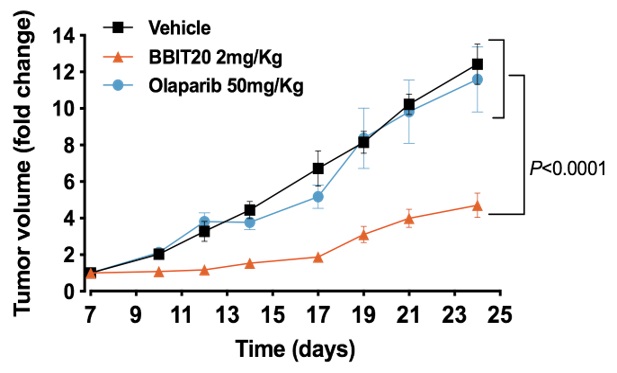
The invention herein disclosed relates to BBIT20 as a new inhibitor of BRCA1-mediated homologous recombination DNA repair small molecule, with a potential use as antitumor agent for ovarian and breast cancer.
BRCA1 and BRCA2 coordinate several cellular processes with a critical role in DNA repair by homologous recombination. In particular, BRCA1 plays these roles in association with its binding partner, BARD1, which stabilizes and confines BRCA1 to the nucleus, facilitating DNA double strand breaks repair mostly by homologous recombination.
As such, disruption of the BRCA1-BARD1 heterodimer results in loss of BRCA1 normal function and decreased expression of BRCA1, BARD1 and other main DNA repair factors. Despite the relevance of a functional BRCA1/2 pathway in tumour formation, in established tumours, this is associated with poor prognosis and therapeutic resistance due to a continuous activation of DNA damage repair pathways.
Consistently, a defective DNA repair pathway may positively influence cancer cells sensitivity to chemo- and radiotherapy, which rely on the induction of DNA damage to induce cell death. BBIT20 represents a new DNA damage response-targeting agent, which inhibits the homologous recombination DNA repair pathway through disruption of the BRCA1/BARD1 interaction. It showed to be highly selective to cancer cells (with low interference with the growth of normal cells) and has no apparent toxic effects in mouse models. Additionally, several advantages were found in comparison with standard antitumor therapies
BBIT20 displays much higher antitumor activity than olaparib in immortalized breast (including highly resistant and therapy orphan triple-negative breast cancer subtype) and ovarian cancer cells;
BBIT20 displays much higher antitumor activity than olaparib in patient-derived ovarian cancer cells;
BBIT20 displays much higher antitumor activity than olaparib in xenograft mouse models of ovarian cancers (with mutant BRCA1);
BBIT20 has marked in vitro and in vivo synergistic combinatorial effects with other chemotherapeutic drugs, including platinum drugs and poly (ADP-ribose) polymerase (PARP) inhibitors (PARPi);
Breast and ovarian cancer cells do not develop resistance to BBIT20 treatment
BBIT20 can be used as chemical probe in the BRCA1 research field and/or as anticancer agent after further development, contributing to overcome cancer resistance to conventional therapy and PARPi.






